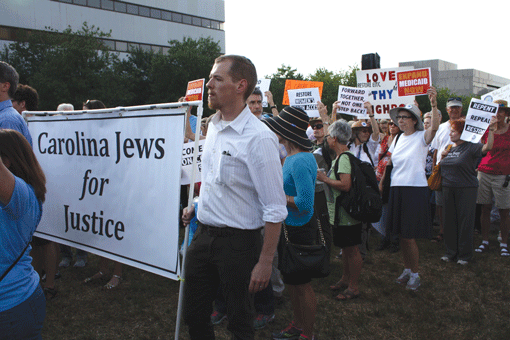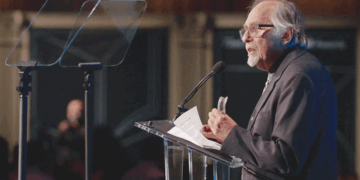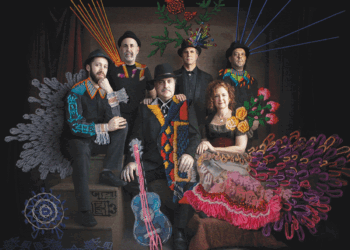Carolina Jews for Justice first joined with a group of black ministers to speak out against the state’s strongly conservative agenda
By ANTHONY WEISS
RALEIGH, N.C. (JTA) — It was a hot Monday afternoon, but Judy Katzin was standing on the grassy mall outside the North Carolina State Capitol beside the Carolina Jews for Justice banner, as she has many times.
Katzin was among hundreds of activists of diverse backgrounds who had come to participate in the week’s Moral Monday protest. This time, however, she had brought a pair of new voices — her grandsons, Carson and Noah Merenbloom.
“Most of North Carolina is so conservative,” said Noah, 15. “It’s important to come out here as Jews because we’re a minority.”
North Carolina’s Moral Monday protests have garnered national attention as a sign of liberal energy in a state whose politics have shifted sharply to the right.
The shift has provoked a confrontational turn in North Carolina politics, with the Republican-controlled state government pushing a strongly conservative agenda and liberal activists responding with acts of civil disobedience at the State Capitol during which hundreds have been arrested.

The state’s Jews, a small and traditionally politically low-key community, are speaking with a louder voice.
“You’re dealing with a Jewish community in a new era,” said Eli Evans, the author of The Provincials: A Personal History of Jews in the South and the son of a former mayor of Durham, Mutt Evans. “There has been a growth of enormous self-confidence in the Jewish community about politics and about its public stance.”
Carolina Jews for Justice was formed in March of 2013, two months after the Republicans took simultaneous control of the state legislature and the governor’s mansion for the first time in more than a century.
The new Republican-dominated government immediately set out to implement legislation that would, over time, reduce unemployment benefits, tighten voting regulations, cut state funding for public education, block expansion of Medicaid under the Affordable Care Act, tighten restrictions on abortion and, most recently, loosen regulations on fracking.
Appalled by these legislative moves, a group of people from local synagogues gathered in the Raleigh living room of Terry Grunwald and started to talk about their options.
“We felt we really wanted to have a voice, as Jews, coming out of our Jewish tradition and Jewish ethics,” said Grunwald, a board member of Carolina Jews for Justice. “We felt like we wanted an alternative that would be not tied to any particular local institution, whether it’s a synagogue or a federation.”
Shortly thereafter, Grunwald recalled, roughly a dozen of the members went to the legislature to lobby their representatives. While they were there, they noticed a large gathering outside, which subsequently came into the building to protest.
“We sat there and watched the first Moral Monday at the General Assembly,” she said, referring to the state legislature. “We felt a very strong pull to be a part of that.”
The fledgling Jewish organization quickly joined the burgeoning protest movement.
“By the third Moral Monday, maybe the second, we were there with our banner,” said group co-founder Jane Pinsky. “We drew people from all over the state simply because we had a banner that said Carolina Jews for Justice. That gave people a place to coalesce.”
However, the new alliance with the protest movement also involved some challenges.
The Moral Mondays protests were organized by the president of the North Carolina NAACP, the Rev. William Barber, with the assistance of a number of black ministers with roots in civil rights activism. When Carolina Jews for Justice began to participate, a number of its members were disconcerted by the frequent invocations of Jesus Christ, quotations from the New Testament and the generally Christian atmosphere of the gathering.
“To their credit, they were open and listened to people who said we want our community to feel comfortable in these settings as well,” Grunwald said.
Carolina Jews for Justice’s participation, in turn, helped broaden the appeal of the Moral Mondays movement. A group of 12 rabbis signed a letter in support of the protests, and Jewish activists appeared before county election boards to argue in favor of preserving Sunday early voting days, which are popular among black churches, on the grounds that religious Jews couldn’t vote on Saturdays.
“It raises interesting issues for those of us who try to keep church and state apart, but in the South it is useful to have a Bible verse you can deliver,” said Rabbi Raachel Jurovics, the leader of a Jewish Renewal congregation in Raleigh who has addressed the Moral Mondays gatherings.
The efforts of Carolina Jews for Justice, however, have not drawn universal acclaim in the Jewish community. Some of the criticism has been ideological, with some politically conservative Jews pushing their rabbis not to participate.
There are differing views as well over whether or not Jews should protest overtly as Jews or rather simply as citizens of North Carolina.
“I really don’t feel like Jews have got to be set up in North Carolina Jews for Justice,” said Stanley Fox, a Democratic former state legislator from Oxford. “There are issues we should be protesting, like cuts in teachers’ salaries, but they have nothing to do with being Jewish or gentile or anything else.”
A number of North Carolina Jews had played key roles in the civil rights movement, such as brothers Mutt and Monroe Evans, who helped lead desegregation efforts as the mayors of Durham and Fayetteville, respectively. However, many Jews preferred to keep a lower political profile.
“Jews generally tended to be moderates or gradualists,” said Leonard Rogoff, research historian of the Jewish Heritage Foundation of North Carolina. “They tended not to be politically involved.”
Beginning in the 1960s, the Raleigh-Durham-Chapel Hill metropolitan area, commonly known as “The Triangle,” became ground zero for a significant shift in North Carolina’s economy and culture. The establishment of Research Triangle Park, a high-tech research and development campus, along with the expansion of the nearby universities of Duke, the University of North Carolina at Chapel Hill and North Carolina State in the capital city all transformed the area into a growth engine for the so-called knowledge economy.
That, in turn, brought an influx of highly educated workers from outside the state, including a significant number of Jews. In the Durham-Chapel Hill area, for example, the Jewish population swelled from 545 in 1964 to 3,300 in 1991 and has continued growing since.
The changes have transformed the face of the Jewish population.
“Many of the people who are involved with [Carolina Jews for Justice] are people who have moved to the area and have had other experiences community organizing, or people who have been progressive and active but have done that outside the Jewish community,” said Rabbi Eric Solomon, who leads the Conservative Beth Meyer Synagogue in Raleigh, one of the state’s oldest congregations. “There are some people in the Jewish community who are more Southern in their roots. They’re very concerned about this, but their style is more, ‘Let’s be careful.’”
As Monday’s rally outside wound down, the NAACP’s Barber thanked “our Jewish friends” and led the protesters on a march around the State Capitol. Then the rally dispersed, with the protesters vowing to come back the next week.


















